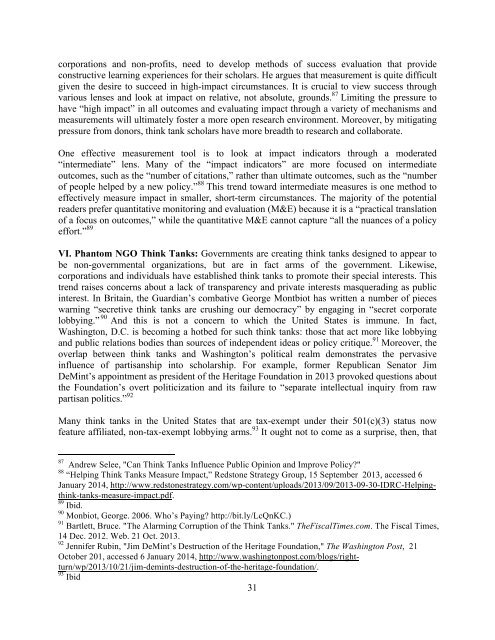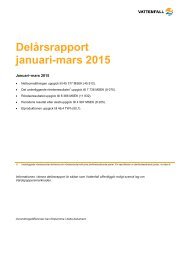2014-global-go-to-think-tank-index-22012015_1
2014-global-go-to-think-tank-index-22012015_1
2014-global-go-to-think-tank-index-22012015_1
- No tags were found...
Create successful ePaper yourself
Turn your PDF publications into a flip-book with our unique Google optimized e-Paper software.
corporations and non-profits, need <strong>to</strong> develop methods of success evaluation that provide<br />
constructive learning experiences for their scholars. He argues that measurement is quite difficult<br />
given the desire <strong>to</strong> succeed in high-impact circumstances. It is crucial <strong>to</strong> view success through<br />
various lenses and look at impact on relative, not absolute, grounds. 87 Limiting the pressure <strong>to</strong><br />
have “high impact” in all outcomes and evaluating impact through a variety of mechanisms and<br />
measurements will ultimately foster a more open research environment. Moreover, by mitigating<br />
pressure from donors, <strong>think</strong> <strong>tank</strong> scholars have more breadth <strong>to</strong> research and collaborate.<br />
One effective measurement <strong>to</strong>ol is <strong>to</strong> look at impact indica<strong>to</strong>rs through a moderated<br />
“intermediate” lens. Many of the “impact indica<strong>to</strong>rs” are more focused on intermediate<br />
outcomes, such as the “number of citations,” rather than ultimate outcomes, such as the “number<br />
of people helped by a new policy.” 88 This trend <strong>to</strong>ward intermediate measures is one method <strong>to</strong><br />
effectively measure impact in smaller, short-term circumstances. The majority of the potential<br />
readers prefer quantitative moni<strong>to</strong>ring and evaluation (M&E) because it is a “practical translation<br />
of a focus on outcomes,” while the quantitative M&E cannot capture “all the nuances of a policy<br />
effort.” 89<br />
VI. Phan<strong>to</strong>m NGO Think Tanks: Governments are creating <strong>think</strong> <strong>tank</strong>s designed <strong>to</strong> appear <strong>to</strong><br />
be non-<strong>go</strong>vernmental organizations, but are in fact arms of the <strong>go</strong>vernment. Likewise,<br />
corporations and individuals have established <strong>think</strong> <strong>tank</strong>s <strong>to</strong> promote their special interests. This<br />
trend raises concerns about a lack of transparency and private interests masquerading as public<br />
interest. In Britain, the Guardian’s combative George Montbiot has written a number of pieces<br />
warning “secretive <strong>think</strong> <strong>tank</strong>s are crushing our democracy” by engaging in “secret corporate<br />
lobbying.” 90 And this is not a concern <strong>to</strong> which the United States is immune. In fact,<br />
Washing<strong>to</strong>n, D.C. is becoming a hotbed for such <strong>think</strong> <strong>tank</strong>s: those that act more like lobbying<br />
and public relations bodies than sources of independent ideas or policy critique. 91 Moreover, the<br />
overlap between <strong>think</strong> <strong>tank</strong>s and Washing<strong>to</strong>n’s political realm demonstrates the pervasive<br />
influence of partisanship in<strong>to</strong> scholarship. For example, former Republican Sena<strong>to</strong>r Jim<br />
DeMint’s appointment as president of the Heritage Foundation in 2013 provoked questions about<br />
the Foundation’s overt politicization and its failure <strong>to</strong> “separate intellectual inquiry from raw<br />
partisan politics.” 92<br />
Many <strong>think</strong> <strong>tank</strong>s in the United States that are tax-exempt under their 501(c)(3) status now<br />
feature affiliated, non-tax-exempt lobbying arms. 93 It ought not <strong>to</strong> come as a surprise, then, that<br />
87 Andrew Selee, "Can Think Tanks Influence Public Opinion and Improve Policy"<br />
88 “Helping Think Tanks Measure Impact,” Reds<strong>to</strong>ne Strategy Group, 15 September 2013, accessed 6<br />
January <strong>2014</strong>, http://www.reds<strong>to</strong>nestrategy.com/wp-content/uploads/2013/09/2013-09-30-IDRC-Helping<strong>think</strong>-<strong>tank</strong>s-measure-impact.pdf.<br />
89 Ibid.<br />
90 Monbiot, George. 2006. Who’s Paying http://bit.ly/LcQnKC.)<br />
91 Bartlett, Bruce. "The Alarming Corruption of the Think Tanks." TheFiscalTimes.com. The Fiscal Times,<br />
14 Dec. 2012. Web. 21 Oct. 2013.<br />
92 Jennifer Rubin, "Jim DeMint’s Destruction of the Heritage Foundation," The Washing<strong>to</strong>n Post, 21<br />
Oc<strong>to</strong>ber 201, accessed 6 January <strong>2014</strong>, http://www.washing<strong>to</strong>npost.com/blogs/rightturn/wp/2013/10/21/jim-demints-destruction-of-the-heritage-foundation/.<br />
93 Ibid<br />
31




